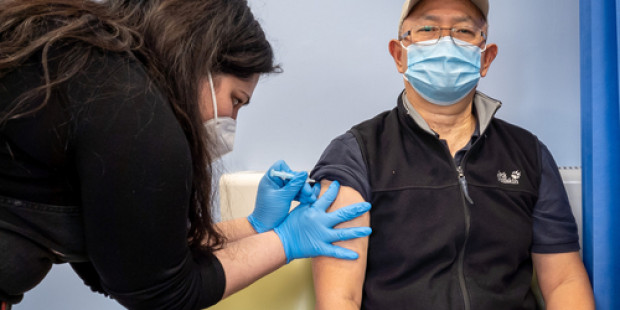What are the symptoms of mpox (monkeypox)?
A range of symptoms have been identified, and some people only experience some of them. Some symptoms of mpox (monkeypox) are similar to many other viruses and colds, and can include:
- fever,
- headache,
- muscle aches,
- backache,
- swollen glands,
- chills,
- exhaustion.
If you develop these symptoms soon after meeting new sexual partners, they could be a sign you have mpox.
New unexpected or unusual spots, ulcers and blisters can develop anywhere on the body, including the face and inside the mouth and throat, and other parts of the body for example the hands, pubis and genitals (penis, testicles, vulva, front hole and anus). In many cases only one or a few spots or ulcers are being found.
Some people with mpox have developed proctitis, which means pain or bleeding in the rectum or anus.
How long after exposure will I notice symptoms?
Initial symptoms can start after as soon as two days but can take up to three weeks. This is usually followed by a rash, small sores, or blisters within one to five days.
Some people only experience mild symptoms and might not even notice them, while other people may have few or no symptoms. This is why we are asking gay and bisexual men to be extra vigilant and check for any of these symptoms, especially if they’ve had recent sexual or prolonged skin to skin contact with other gay and bisexual men.
What does the rash look like?
The spots can change and go through different stages. They can look like chickenpox, anogenital herpes or syphilis, before finally forming a scab, which later falls off. Some people have only had one or a few spots.
What should I do if I think I have mpox (monkeypox)?
If you have new unexpected or unexplained spots, ulcers or blisters anywhere on your body (including the face and/or genitals) or any of the other symptoms outlined above, then contact your local sexual health service by phone – not in person – or contact NHS 111 for advice.
What happens when I test for mpox (monkeypox)?
Currently most people with symptoms for mpox are tested in their local sexual health clinic. Tests are sent to the UK Health Security Agency (UKHSA) laboratory to be analysed and you will be asked by your doctor to provide your name and contact information so they can inform you of the result of your test.
If you test positive, the Health Protection Team at UKHSA will contact you to complete a questionnaire to collect information about close contacts you have had in the past three weeks before your symptoms started. This will include people you live with, and any sexual partners or hook-ups you have met recently.
Close contacts will not be told any information about you. All information is handled privately and securely.
What should I do if I am a ‘close contact’?
Close contacts with symptoms should isolate for 21 days. If you test positive for mpox (monkeypox) you will need to continue to isolate until the last spot or ulcer has scabbed over and fallen off.
You do not need to isolate if you do not have symptoms. However, UKHSA has issued guidance for close contacts, depending on the risk of you developing mpox.
Can mpox (monkeypox) be treated?
There is no treatment for mpox but getting a smallpox vaccine within four days of exposure could prevent an infection or make symptoms much milder.
In extreme cases you might need to visit hospital for pain relief and other medications which might relieve symptoms.
In these cases a drug called tecovirimat can be used. Treatment aims to relieve symptoms. The illness is usually mild and most people recover in two to four weeks.
People with likely or confirmed mpox can isolate at home until they have recovered if they are well enough and able to self-isolate. A small number of people may need to stay in a specialist hospital, so the symptoms can be treated.
Most people with mpox recover within a few weeks. UKHSA is advising people who recover to use condoms during sex for up to 12 weeks after they were exposed to mpox. However, it is important to remember that you can still pass it on through skin-to-skin contact while you have a mpox rash, or spots, ulcers and blisters.



